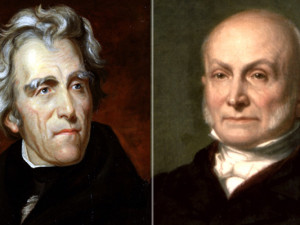
As no presidential candidate had received a majority of the total electoral votes in the election of 1824, Congress decides to turn over the presidential election to the House of Representatives, as dictated by the 12th Amendment to the U.S. Constitution.
In the November 1824 election, 131 electoral votes, just over half of the 261 total, were necessary to elect a candidate president. Although it had no bearing on the outcome of the election, popular votes were counted for the first time in this election. On December 1, 1824, the results were announced. Andrew Jackson of Tennessee won 99 electoral and 153,544 popular votes; John Quincy Adams—the son of John Adams, the second president of the United States—received 84 electoral and 108,740 popular votes; Secretary of State William H. Crawford, who had suffered a stroke before the election, received 41 electoral votes; and Representative Henry Clay of Kentucky won 37 electoral votes.
As dictated by the Constitution, the election was then turned over to the House of Representatives. The 12th Amendment states that if no electoral majority is won, only the three candidates who receive the most popular votes will be considered in the House. Representative Henry Clay, who was disqualified from the House vote as a fourth-place candidate, agreed to use his influence to have John Quincy Adams elected. Clay and Adams were both members of a loose coalition in Congress that by 1828 became known as the National Republicans, while Jackson’s supporters were later organized into the Democratic Party.
Thanks to Clay’s backing, on February 9, 1825, the House elected Adams as president of the United States. When Adams then appointed Clay to the top cabinet post of secretary of state, Jackson and his supporters derided the appointment as the fulfillment of a corrupt agreement.
With little popular support, Adams’ time in the White House was largely ineffectual, and the so-called Corrupt Bargain haunted his administration. In 1828, he was defeated in his reelection bid by Andrew Jackson, who received more than twice as many electoral votes than Adams.
It is my sincere desire to provide readers of this site with the best unbiased information available, and a forum where it can be discussed openly, as our Founders intended. But it is not easy nor inexpensive to do so, especially when those who wish to prevent us from making the truth known, attack us without mercy on all fronts on a daily basis. So each time you visit the site, I would ask that you consider the value that you receive and have received from The Burning Platform and the community of which you are a vital part. I can't do it all alone, and I need your help and support to keep it alive. Please consider contributing an amount commensurate to the value that you receive from this site and community, or even by becoming a sustaining supporter through periodic contributions. [Burning Platform LLC - PO Box 1520 Kulpsville, PA 19443] or Paypal
-----------------------------------------------------
To donate via Stripe, click here.
-----------------------------------------------------
Use promo code ILMF2, and save up to 66% on all MyPillow purchases. (The Burning Platform benefits when you use this promo code.)






JQ Adams won by the corrupt bargain…His father John Adams won in 1796 when 3 Jefferson electors defected to Adams….Interesting how these Harvard backed candidates win…
Article lies right off the bat. Clay was a whig which was a party until the 1850s.
I too scratched my head at the Whigs being described as a “loose coaliton” of congressman.
Maybe Bill Gates wrote it.